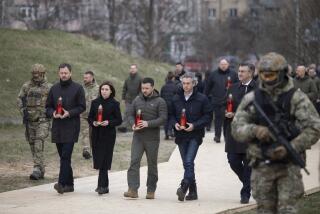U.N. Pressures Iraq to Divulge Weapons Data
- Share via
WASHINGTON — The U.N. Special Commission on Iraq has sent two commissioners to Baghdad to demand that Iraqi authorities provide information to satisfy still-unanswered questions about their chemical and biological warfare programs.
On one key issue, Commissioners John Gee of Australia and Peter Von Buttler of Germany are trying to pressure the Iraqis to reveal the blueprints and program plans for the chemical and biological weapons that were manufactured by Iraq, a commission official said Tuesday.
In almost a year of on-site inspections, U.N. inspectors have managed to uncover documentation proving that the Iraqis had plans for a nuclear weapons program. But although they found chemical weapons and agents that could be used in biological weapons, the inspectors have never been able to find the documentation revealing the exact plans of the Iraqis in these fields.
Although they do not have this information, the official said, they have no evidence to suggest that Iraq is hiding plants that are still producing chemical and biological weapons.
“We don’t believe that the Iraqis have such plants,” he said. “But we are always looking for any indication that they are doing what they are not supposed to do.”
In this regard, another U.N. team of 18 chemical and biological inspectors--who were harassed by about 40 Iraqi demonstrators as they arrived at their hotel in Baghdad on Monday--have started their work of inspecting declared chemical and biological weapons sites, checking for possible concealed sites and supervising the test destruction of some chemical weapons.
Gee and Von Buttler arrived in Baghdad at the same time as the inspectors and plan to stay in Iraq until Friday.
The fact that the two commissioners are in Iraq seeking answers made it even more likely that the Security Council will vote to continue economic sanctions against Iraq. The council, which had planned to take up the matter Tuesday, delayed a decision so that members could study a U.N. report on Iraqi cooperation with the Special Commission.
More to Read
Sign up for Essential California
The most important California stories and recommendations in your inbox every morning.
You may occasionally receive promotional content from the Los Angeles Times.













